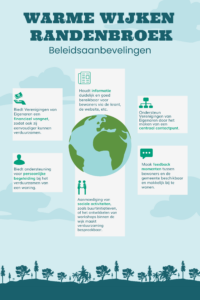Policy and evaluation research, project “Warme wijken”
We offer an unique learning opportunity where students write a policy advice to municipalities based on the interviews students had with residents of the municipalities. With several external parties and interests at play, expectation management becomes crucial for teachers.
Background information
Our external partners are citizens, municipalities, and Academie van de Stad. Students will go into neighborhoods of the municipalities involved, to interview residents about the energy transition. Participating municipalities would like to have a better understanding of the experiences of their citizens in order to improve their policy. Students can fulfil this need by doing a research project that collects data from citizens and by presenting their results to the municipality and giving policy recommendations. Academie van de Stad serves as a partner that facilitates contact between teachers, students, and municipalities.
Project description
Students work in teams to write one cohesive report per seminar group, while also writing one research report per team. Teachers serve as supervisors of the research project. Students meet our external partners on several occasions. First, we have a kickoff meeting at the UU with municipalities and Academie van de Stad present. Second, students and teachers travel to their assigned neighborhood. They get a tour of the neighborhood where they will collect data and the municipality presents their research interests. In some municipalities, residents or other external parties also join the meeting to give a tour or presentation. Third, students present their research proposal to municipalities during a seminar at the UU where the teacher chairs the meeting. Fourth, students travel to the municipalities to collect their data. Fifth, in a festive meeting with everyone, we have a presentation session at a non-university location with drinks afterwards. All student teams present their results and policy recommendations and we have a Q&A with the municipalities.
Aims
This project aims to facilitate a meaningful learning experience for students while providing actionable insights to municipalities regarding the energy transition, by engaging in a collaborative research endeavor that involves conducting interviews with residents. Through this process, students develop skills in research methodology, data analysis, and policy formulation, while municipalities benefit from valuable input to enhance their policies and initiatives related to the energy transition.
Results
Using a mixed-methods research design, all student teams were able to give valuable input to municipalities and capture the daily life experiences of their residents. Municipalities were very pleased with the findings and work of students, and were enthusiastically exchanging ideas with different municipalities at our final session.
Student experiences are that they enjoy to have a practical project, but that there are several aspects that were difficult, such as designing a research question that matches the interests of the municipalities that is also possible to study with the data collection. The data collection experience itself varied for our students. Some neighborhoods have residents that are distrustful of strangers knocking on their doors, whereas other neighborhoods fulfill the cliché of friendly older people taking their time to help out students. Policy advice is something that students did not necessarily experience as difficult, and they all used the input of the citizens they had interviewed for this.
Reflection: lessons learned
- The teacher role is crucial in managing the different interests of students, citizens, and external partners. For example, they need to make sure there is room for students’ input while contributing to the research questions of the municipality. At the policy stage, teachers need to instruct students that these are based on the interviews with residents, but that the policy advice also needs to be manageable for the municipality.
- A qualitative design is the best method to make sure citizens voices are heard and to have a meaningful conversation between student and citizen.
- Input of citizens before the data collection starts can help to make the contact between students and citizens less one-directional.
- The final session worked best as an exchange between the external partners and students. A livestream for interviewed residents during the final presentation was only used by a small minority.
- Giving something back to participating citizens is important, also according to students themselves. An infographic designed by students distributed to citizens is a helpful tool to achieve reciprocity.
- In data collection, distrust towards research and strangers knocking on doors cannot be avoided. What we can do, is to better prepare our students for these situations and think about ways to decrease distrust, such as municipalities informing citizens about the data collection beforehand.
Further reading

Figure 1. Infographic of “warme wijken randenbroek”
